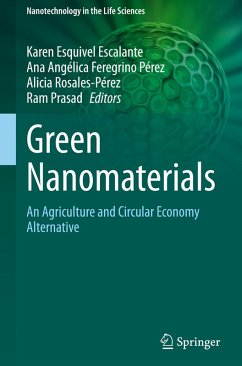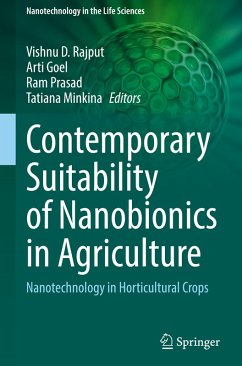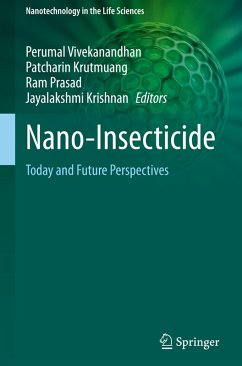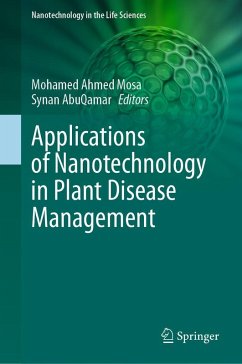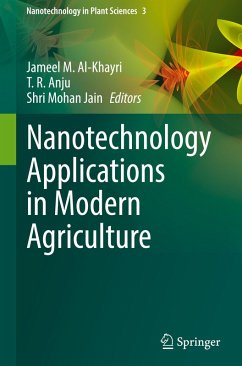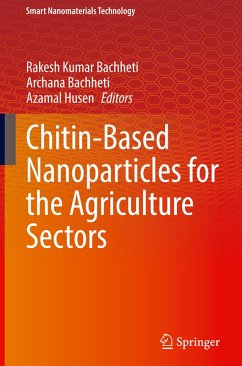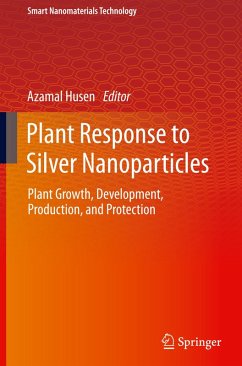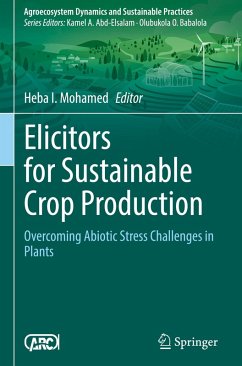
Revolutionizing Agriculture: A Comprehensive Exploration of Agri-Nanotechnology

PAYBACK Punkte
68 °P sammeln!
Agriculture is facing unprecedented challenges including climate change, declining arable land, and a growing global population. To meet the increasing demand for food while minimizing environmental impact, innovative solutions are required. Nanotechnology offers promising avenues to enhance agricultural productivity, sustainability, and food security. "Revolutionizing Agriculture: A Comprehensive Exploration of Agri-Nanotechnology" is an ambitious and timely book that sheds light on the transformative potential of nanotechnology in agriculture.This book is an exploration of agri-nanotechnolog...
Agriculture is facing unprecedented challenges including climate change, declining arable land, and a growing global population. To meet the increasing demand for food while minimizing environmental impact, innovative solutions are required. Nanotechnology offers promising avenues to enhance agricultural productivity, sustainability, and food security. "Revolutionizing Agriculture: A Comprehensive Exploration of Agri-Nanotechnology" is an ambitious and timely book that sheds light on the transformative potential of nanotechnology in agriculture.
This book is an exploration of agri-nanotechnology covering foundational principles, various applications, environmental considerations, and future trends. It serves as a valuable resource for researchers, academics, students, policymakers, and industry professionals interested in the intersection of nanotechnology and agriculture. By addressing both the scientific and societal implications of agri-nanotechnology, thisbook contributes to the sustainable development of agriculture in the 21st century.
This book...
Expands existing knowledge and understanding of applications of nano-materials in agriculture, exploring their chemical structures, properties, and biological activities;Provides readers with a foundational understanding of nanoscale science and its relevance to agriculture;Explores various types of nanomaterials and their applications in crop production, soil management, and pest control;Discusses the use of nanosensors for real-time monitoring of soil and crop conditions, as well as data analytics for precision agriculture;Addresses the development of nanopesticides, nanofertilizers, and nanodelivery systems to reduce chemical use and enhance crop protection;Examines how nanotechnology can contribute to sustainable practices such as water management, waste reduction, and energy efficiency;Discusses the regulatory framework and ethical concerns surrounding the use of nanotechnology in agriculture;Bridges the gap between the fields of agriculture, biotechnology, chemical and physical sciences.
This book is an exploration of agri-nanotechnology covering foundational principles, various applications, environmental considerations, and future trends. It serves as a valuable resource for researchers, academics, students, policymakers, and industry professionals interested in the intersection of nanotechnology and agriculture. By addressing both the scientific and societal implications of agri-nanotechnology, thisbook contributes to the sustainable development of agriculture in the 21st century.
This book...
Expands existing knowledge and understanding of applications of nano-materials in agriculture, exploring their chemical structures, properties, and biological activities;Provides readers with a foundational understanding of nanoscale science and its relevance to agriculture;Explores various types of nanomaterials and their applications in crop production, soil management, and pest control;Discusses the use of nanosensors for real-time monitoring of soil and crop conditions, as well as data analytics for precision agriculture;Addresses the development of nanopesticides, nanofertilizers, and nanodelivery systems to reduce chemical use and enhance crop protection;Examines how nanotechnology can contribute to sustainable practices such as water management, waste reduction, and energy efficiency;Discusses the regulatory framework and ethical concerns surrounding the use of nanotechnology in agriculture;Bridges the gap between the fields of agriculture, biotechnology, chemical and physical sciences.





